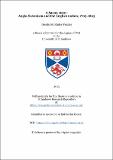A Saxon state : Anglo-Saxonism and the English nation, 1703-1805
Abstract
For the past century, medievalism studies generally and Anglo-Saxonism studies in particular have largely dismissed the eighteenth century as a dark period in English interest in the Anglo-Saxons. Recent scholarship has tended to elide Anglo-Saxon studies with Old English studies and consequently has overlooked contributions from fields such as archaeology, art history and political philosophy. This thesis provides the first re-examination of scholarly, antiquarian and popular Anglo-Saxonism in eighteenth-century England and argues that, far from disappearing, interest in Anglo-Saxon culture and history permeated British culture and made significant contributions to contemporary formulations and expressions of Englishness and English national, legal and cultural identities.
Each chapter examines a different category of Anglo-Saxonist production or activity, as those categories would be distributed across current scholarship, in order to explore the ways in which the Anglo-Saxons were understood and deployed in the construction of contemporary cultural- historiographical narratives. The first three chapters contain, respectively, a review of the achievements of the ‘Oxford school’ of Saxonists of the late seventeenth and early eighteenth centuries; antiquarian Anglo-Saxon studies by members of the Society of Antiquaries of London and their correspondents; and historiographical presentations of the Anglo-Saxons in local, county and national histories. Chapters four and five examine the appearance of the Anglo-Saxons in visual and dramatic art, and the role of Anglo-Saxonist legal and juridical language in eighteenth-century politics, with reference to discoveries resulting from the academic and antiquarian research outlined in chapters one to three. It is my contention that Anglo-Saxonism came to serve as a unifying ideology of origins for English citizens concerned with national history, and political and social institutions. As a popular as well as scholarly ideology, Anglo-Saxonism also came to define English national character and values, an English identity recognised and celebrated as such both at home and abroad.
Type
Thesis, PhD Doctor of Philosophy
Rights
Embargo Reason: Embargo period has ended, thesis made available in accordance with University regulations
Collections
Items in the St Andrews Research Repository are protected by copyright, with all rights reserved, unless otherwise indicated.

